Special feature: Hitting the right notes
Special feature: Hitting the right notes McGill University
User Tools (skip):
Hitting the right notes
"When words leave off, music begins," said 19th-century German poet Heinrich Heine. Unfortunately, we can't provide a soundtrack with the McGill Reporter, so you'll just have to read our stories about the faculty and students of McGill's Schulich School of Music. Cellist Matt Haimovitz brings classical music to off-beat venues; jazz-cat undergrads make a downtown club their classroom; doctoral student Yaniv Attar works with top conductor Kurt Masur; students turn to sports med when play leads to injury, and teachers give courses to those who don't like homework.
"Mini" moves to music
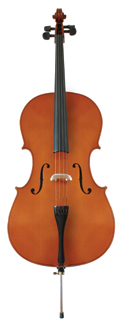
Babies fall asleep to lullabies, teen angst is often accompanied by a guitar, couples marry then dance the night away — our lives all have soundtracks, yet most of us can't tell a viola from a violin. And many could make more sense of Sanskrit than a musical score. Pulling back the curtain on the arcane mysteries of the tuneful arts is the Mini-Music school, hosted by the Schulich School of Music.
Beginning April 25, the Mini-Music school is a six-week series of lectures for folks interested in learning more about music, but not necessarily ready to commit their lives to symphonic creation. Modelled on the ever-popular Mini-Med and Mini-Law schools, these lectures for laypersons will range from learning about the lives of professional musicians to the soundscape of opera to understanding jazz.
Leading off the series, Jazz Studies professor Gordon Foote will aim to "Stamp Out Jazz Ignorance" with his provocatively titled talk. Focusing on the familiar blues and "I-got-rhythm" tunes, Foote will talk about various aspects of listening to jazz, in hopes of demystifying the genre.
"Jazz is sort of en vogue," explains Foote, "but [listeners] don't really know how it all works."
With his 31 years of teaching and performing experience, Foote is the man to bring his know-how to the people. This classical clarinet player-cum-swingin'-saxophonist helped jump-start McGill's Jazz Studies undergraduate program in 1986 and the graduate program in 1992 — the first of their kind in Canada.
Finding classical music too structured for his taste, Foote hopped the fence. While jazz remains quite structured in harmony and form, Foote loves all the choices one is able to make while playing. "There are a million different ways of playing the same tune," he says.
There are also a million ways of living a musical life. Building on both personal and professional experience, Performance Department professor Abe Kestenberg will introduce the audience to the professional musician's life in his talk, "A View from the Pit."
The lecture will also incorporate aspects of his course, "Introduction to Life as a Professional Musician," where students meet label managers and film music writers. "It's a practical course," explains Kestenberg. "It shows them how people integrate music into their professional lives."

His 40-year career spans Broadway shows, circuses, television, radio — not to mention some 900 ice shows. From Marlene Dietrich to Cher, Kestenberg's played it on his sax, clarinet or flute.
Life as a musician isn't always glamorous, as he'll surely tell the audience. "You're umbilically tied to your instrument," he says, then laughingly adds that even on holiday, he can be found practicing while his family hits the beach. "A musician never takes a vacation!"
For Mini-Music students all this pleasurable learning without homework and tests is because of volunteer extraordinaire, Kappy Flanders.
The woman behind the Mini-Med school idea at McGill, Flanders approached the Music School about a year ago with the idea of making the musical series as a great way to share the school's range of music-related research and teaching with the public to make the art user-friendly. With a new building to play host, the department was keen on the idea.
"Well, it's sold out," chuckles Dean of Music Don McLean, who will lecture on listening fundamentals. "We're very excited because, other than the concerts, it's the first broad outreach event in the new Tanna Schulich Hall. That's really important for us."
Spring is a time for growth, so sit back and open your ears to Mini-Music. Maybe the next time instead of "I like it," you'll find yourself saying, "I like it because…"
Mini-Music, Tuesday evenings, from April 25-May 30, SOLD OUT.
Cellist takes audiences to point of no return
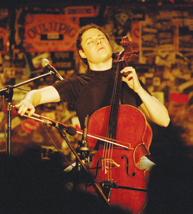
The idea of wearing tails is, to me, pretty obsolete, says maverick cellist, Matt Haimovitz.
HARRY DIORIO
Surely it was a mistake; the twisted joke of a demented publicist who, in 2002, listed Matt Haimovitz as the coming attraction at New York's infamous punk club, CBGB. Matt Haimovitz? Cellist extraordinaire who gave his first Carnegie Hall performance at the age of 13, slated to play Bach solo suites for cello at this seedy mecca of underground music? An artist who had performed alongside such legends as Yo-Yo Ma and Isaac Stern, daring to place his beloved 1710 Matteo Gofriller cello on the same stage that has shuddered beneath the primal rage of bands like Urge Overkill, Railroad Jerk and Iron Prostate?
But it was no mistake; just Haimovitz's daring attempt to rediscover the vibrancy that once thrilled him as a teenage prodigy. "I had felt like the concert experience had become too sterile," he remembers. "Audiences thought they had to be quiet and inhibit their response to music.
"That's not something that was part of the classical tradition," continues the professor at McGill's Schulich School of Music. "Haydn was writing a new quartet every week to surprise and bewilder his audience. People were expected to laugh at the musical humour and cry when they were moved."
Looking to break down the walls between artist and audience, Haimovitz began playing in alternative venues — coffeehouses, nightclubs and even pizza parlours. Pomp and formality gave way to energy and intimacy. "The chemistry and electricity were amazing," he says. "It made me rethink what I was doing as a performer."
Suddenly he was able to change set lists on a nightly basis, a freedom he didn't have before. "When I was only playing classical concertos, I would know exactly what I was going to be playing two or three years in advance," says Haimovitz.
Haimovitz doesn't place much stock in the way music is marketed along genre lines. "With iPods and people being able to download whatever songs they want, whatever styles they like, they are developing their own repertoire. They'll listen to a bit of rock, a little hip-hop, some jazz and, hopefully, some classical."
He further muddies the waters in his most recent CD "Goulash!" which he recorded with UCCELLO, a group comprised of his McGill cello students. An homage to Béla Bartók, the 20th-century Hungarian composer, the disk includes a song by one of rock's iconic bands, Led Zeppelin, arranged for cello.
These days, Haimovitz is comfortable in any venue he plays, be it New York's renowned Lincoln Center or Seattle's Tractor Tavern. He's concluded that the experience of playing in a range of rooms has enhanced his performance skill; he now imports to concert halls the chemistry and intimacy he developed in alternative spaces and upholds elsewhere the same exacting standards he maintains in concert halls. In the end, however, Haimovitz believes that good music naturally transcends the confines of venue, genre and definition. "To me, once you hear a good piece of music, you can't live without it. When that happens, you can never turn back."
Conducting with the greats
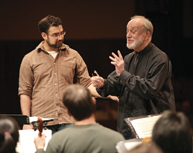
DMus student Yaniv Attar with conductor Kurt Masur at the Manhattan School of Music
R. ANDREW LEPLEY
Yaniv Attar's first memorable exposure to orchestra music, at about age 14 in his native Israel, was overhearing his film-student sister's soundtrack to A Clockwork Orange, which included Beethoven's Ninth Symphony. "I was fascinated," he said. Soon after, he went to his first orchestral concert. "It was a terrible orchestra, but I didn't know that. To me they were the world."
Now a first year doctoral student of conducting, Attar was chosen by renowned conductor Kurt Masur for a weeklong seminar held at New York City's Manhattan School of Music in January. Attar and 13 other conductors worked daily with the school's orchestra in a master class with Masur, followed by rehearsal discussion and critique.
Attar had seen Masur on the podium many times. "He's tough. I must say I was a little scared. But off the podium he's such a warm man. I was nervous going there, but it turned out to be an amazing experience."
He was used to thinking of the technical aspect of conducting, but during the seminar, Attar had the luxury of being able to focus on the music because the orchestra was so well prepared. He tackled the second movement of Tchaikovsky's Symphony No. 6, which was performed on the final evening to a standing room only audience.
Attar, who left Israel to study guitar at the Royal College in London and then developed a love of conducting at Julliard, says Masur got him to think about his musical gestures, the meaning of the music, the state of the composer, and how to bring all that into the performance of the piece. At McGill, he's already done a master's in conducting with McGill Symphony Orchestra leader and professor Alexis Hauser. "I'm so lucky," he said, "to have him as my teacher."
Fresh Jazz takes da cats to school
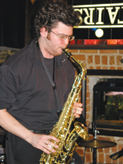
Skoodly Wap! Music student Philippe Bouffard blows a note at downtown jazz club, Upstairs.
Erica Zelfand
It's Monday, a school night, and the four undergrads from McGill are working hard. Guillaume St. Laurent is racing his fingers up and down the piano while Philippe Bouffard struts and puffs with the sax. Brothers Rémi and Nicolas Bédard hang further back, popping out the rhythm on drums and double bass.
The classroom is Upstairs, a downtown jazz bar tucked just below Ste Catherine on MacKay Street. The four students play under the watchful eye of veteran jazz cat. Michael Gauthier, who is also an instructor at the Schulich School of Music at McGill.
"Fresh Jazz" at Upstairs is part of the curriculum for the McGill foursome and other students in the jazz program, giving them a chance to polish their performance skills before a real club audience. This evening, the downtown patrons look on approvingly and sip sangria as the smartly dressed students swing from one song to another.
"It's real life training — except we're not paid," laughs Guillaume. It's his second appearance at the club and he appears to be enjoying every minute of it.
"It's an incentive to polish your product because you're doing it front of an audience," says Gauthier. "I think it's fun for them to play in a club. And the reaction of the people watching is a good barometer of how they're doing."
Fresh Jazz takes place every Monday and Tuesday night from 8:30 to 11:00, September through April, at Upstairs Jazz Bar, 1254 Mackay Street (931-6808). The shows are free of charge.
Strains of music
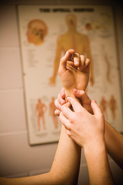
Working out the aches and pains of musical motions at McGill's sports medicine clinic.
Claudio Calligaris
Imagine thirty violinists sitting in a cold rehearsal room for two hours without a break, craning their necks and twisting their wrists, holding their bows high. Imagine a keyboard player going over the same finger-twisting cadence until her forearms ache and her back spasms. Because of the physical challenges that musicians face, they often end up with tendonitis and other injuries. However, according to Rezan Onen-Lapointe, president of the Music Undergraduate Student's Association, "there's a stigma around being an injured musician, and most musicians don't know what to do when they are injured."
She hopes that will change now that the McGill Sports Medicine Clinic has teamed up with the Faculty of Music to provide information and treatment options to McGill music students. Rezan, therapist Lynn Bookalam and others are working hard to ensure that music students know what their options are, including going to the varsity clinic for triage. There, a therapist will assess the severity of their injury, determine whether they need to see a doctor or a physiotherapist and set them up with an appointment.
Musicians can develop anything from sciatica to disorders of the temporomandibular joint. Therapist Cristina Pensato says that, "as patients, musicians are just as challenging as athletes because they have deadlines, they work hard and they are often dealing with multiple injuries." Bookalam states, "Our therapists understand that musicians are high-performance people."
Therapists Cynthia Carsley and Cristina Pensato have given a presentation to music students called "Musician's Musculoskeletal Health," outlining specific instrument-related disorders and general prevention techniques. These can include taking adequate rest breaks, adjusting music stands and practicing body awareness. Proper warm-up and correct posture are important for athletes and musicians alike.
Bookalam plans to implement lunch-hour fitness classes at the Faculty of Music similar to McGill's staff fitness program. She is already pleasantly surprised by musicians' eagerness to stay in shape, noting that many musicians understand that overall fitness will improve their longevity and their endurance. "They practice their instruments as much as four hours a day and it's understandable that their bodies will break down," adds Bookalam.
Bookalam believes that the long-term success of this program depends on a good relationship between music professors and the clinic staff. She compares the coach-athlete-therapist relationship to the professor-musician-therapist relationship, because everyone needs to be on the same page in order to keep athletes and musicians in good health. When rehearsals or music programs are structured with unrealistic ideals about what musicians' bodies can take, injuries are harder to prevent. Raising the awareness of musicians as well as their teachers will go far in dealing with the physical demands of a musical career.

